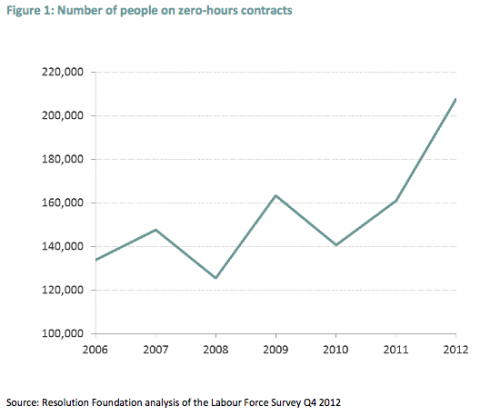One feature of the labour market in the past 10 years has been the rise of zero-hour contracts. This is a contract where the employer is not obliged to employ a worker for any number of fixed hours. It means that the contract is highly flexible in terms of hours worked. This is obviously advantageous for an employer who has fluctuating demand and who seeks to cut the wage bill in quiet periods.

Flexible working hours can have benefits for some types of workers, e.g. students or second income earners who like the flexibility of doing different amounts of hours from week to week. Some also credit flexible working practises for limiting the rise in UK unemployment during the recent recession.
However, for many workers, zero hour contracts have greatly increased the uncertainty of work. It means, in quiet periods, many workers can be left with insufficient income to meet monthly bills. This increased labour market flexibility, thus comes at a cost of increased uncertainty and lower-income.
A report by the resolution foundation investigated the extent and impact of this growth in zero hour contracts. Amongst different factors, they found:
- Those employed on zero hours contracts receive lower gross weekly pay (an average of £236 per week) than those who are not (an average of £482 per week) and workplaces that utilise zero hours contracts have a higher proportion of staff on low pay (between the National Minimum Wage (NMW) of £6. 19 per hour and £7.50 per hour) than those who do not.
- By far the largest group of workers on zero hour contracts tends to be 16-24 year olds. The biggest sector for zero hour contracts is in the health and social care sector. It is more common in the private sector.
- Many on zero hour contracts were not aware of their contract until they found their hours drastically reduced.
- There is concern zero-hour contracts are being used to reduce the contractual obligations of employers to workers, e.g. avoiding maternity and paternity rights.
- Zero hour contracts may be on the rise to avoid the costs associated with employing agency staff. This has increased since 2010 when the Agency Workers Regulations (SI 2010/93) has entitled agency workers to the same pay, terms and working conditions as their full-time equivalents after 12 weeks (3 months)
Related
